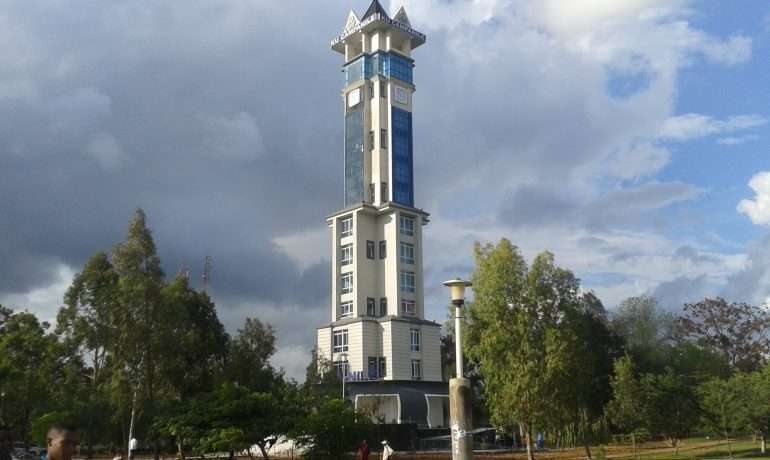Kenyatta University (KU) is the alternate-largest public university in Kenya. The university has a rich history from barrack to its current status as a completely chartered university. It acquired the status of a university in 1985, being the third university after the University of Nairobi (1970) and Moi University (1984). Its main lot is located within 2 counties, that’s Nairobi and Kiambu county. Still, its main lot executive office is located in Nairobi county. However, it was named after the founding chairman of Kenya his excellency mzee Jomo Kenyatta. Since its commencement, K.U has placed itself as a world-class university through exploration and training.
Change hands from Barracks Barracks Kenyatta University.
Initially, Kenyatta University was a Templar Barracks. After Kenya got independence, Templar barracks was has handed over to the Kenyan government. It’s in 1965, the also chairman, mzee Jomo Kenyatta offered the part of the barracks to be used for literacy but no ordnance. Its new name is Kenyatta College. As a council, it primarily offered schoolteacher training (majorly S1 and S2 graduates).
Kenyatta College was also elevated to a constituent council of the University of Nairobi in 1970. It’s through the Kenyatta University Act by the National Assembly of Kenya (1985) that the council was renamed and completely chartered as Kenyatta University.
Although the University has diversified its programs, education remains a popular program for KU.
Academic development of Kenyatta University.
Upon having a charter in 1985, Kenyatta University opened its doors to offer undergraduate degree programs. It started with only three faculties, namely, the Faculty of Arts, Education, and sciences. Over time schools were adopted in place of faculties.
Today, KU has 19 schools. Namely:
- Agriculture and Enterprise Development
- Humanities and Social Sciences
- Business
- Economics
- Education
- Engineering
- Environmental Studies
- Graduate studies
- Medicine
- Pharmacy
- Nursing
- Public Health & Applied Human Science
- Humanities and Social Sciences
- School of Law
- Pure and Applied Sciences
- Visual and Performing Arts
- Security, Diplomacy, and Peace Studies
- Hospitality & Tourism Management
- Digital School of Virtual and Open Learning
In addition, KU has 8 campuses. Namely; Main Campus, Ruiru, Nairobi city, Kitui, Embu, Nyeri, Mombasa, Nakuru, and Parklands. Presently, Kenyatta University’s main campus in Nairobi has enrolled over 30,000 scholars in Kenya for the various degree programs. The Commission for Higher Education in Kenya has accredited Kenyatta University to offer degrees at the undergraduate, master’s, and doctoral levels in Kenya.
- Samantha Lewes age, children, movies, sickness and death.
- Corey Anderson (fighter) Bio-Wiki, Age, Children, Wife, career.
- Melania Trump age, spouse, career, kids, worth, mother’s death.
- Talya Cunningham bio, wiki, age, children, husband, net worth.
- Venita Aspen age, children, husband, southern charm, net worth.
- Susana Harbert Bio, Wiki, KTAB News, Age, Education, Family, Children, Husband, Net Worth, and Career
- Lori Geary age, children, husband, net worth, and career.
Facilities and investments at Kenyatta University.
Kenyatta University has different installations that support tutoring and exploration. in this regard, KU boost of a post-ultra-modern library, wisdom laboratories, sporting fields, swimming pool, spa, morgue, North Coast Beach Hotel, KU radio, KU Tv, Business and Student Service Center, amphitheater, and laboratories. In addition, KU has fiber optic internet connectivity for its scholars and staff.
Kenyatta University is friendly to people living with disabilities (PWD). Originally, its installations have either a lump or a lift making it accessible to PWD. Also, KU has a disability van to move PWD within the lot.
Former Vice Chancellors of Kenyatta University.
Below is a list of KU vice-chancellors from the current to the first.
Prof. Paul Kuria Wainaina- current
Prof. Olive Mwihaki Mugenda
Prof. Everest Standa
Prof. George Eshiwani
Prof. Githinji
Prof. Gachie.
K.U Campanile.

The history of Kenyatta University is well saved at KU Campanile. It’s an altitudinous iconic structure at the university. Besides being a University Museum, Campanile serves as a symbol of identity for KU. Adjoined to Campanile is a KU monument.
Location.
So, the university is 23 kilometers from Nairobi city. it is on the Nairobi to Thika highway, and occupies 1,100 acres of land.
Contacts.
P.O. BOX 43844, Nairobi 00100
Telephone: 020-810901-10, 811278/84
Email: info@ku.ac.ke
Website: www.ku.ac.ke
- Kenya Medical Training College, courses, requirements.
- List of Best private secondary schools in Nairobi County.
- List of best private primary schools in Kirinyaga County.
- What is the history of Kenyatta University?
- A list of special secondary schools, and contacts.
- How is The Lenana Boy school and location?
- Best Public High Schools in Kiambu County.